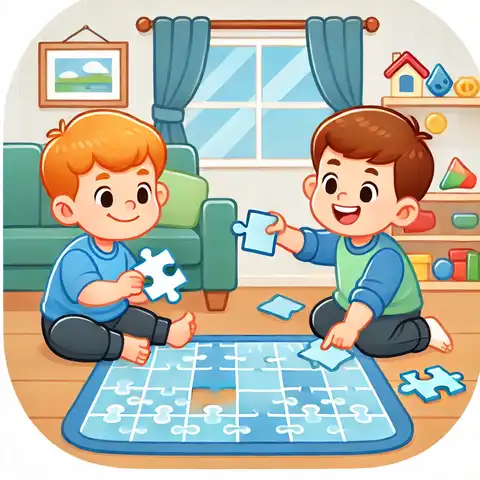Of course, it is, but sibling rivalry can lead to tension, so the family stresses out its eldest son. A certain amount of competition is normal, but extreme competitiveness may result in fights and jealousy. As a parent, you can properly navigate these conflicts and create harmony amongst your family.
What is sibling rivalry?
Sibling rivalry is described as competition, jealousy, or conflict between siblings. It could take the form of arguments, fights, jealousy with their parents, or feelings of being unfair. While a healthy dosage of sibling rivalry is usual, too much can damage sibling relationships.
What Causes Sibling Rivalry?

There are many reasons for sibling rivalry:
Competition for Attention
Siblings compete for the approval of their parents.
Personality Differences
Every child is different. And sometimes, these differences create barriers that lead to confusion or conflict.
Jealousy Over Success
For example, if one child does well at school or sports, the other may feel jealous. This can lead to a real sense of rivalry developing between siblings.
Perceived Favoritism
In a more prominent family, kids may feel like one sibling is the “favorite,” even if this isn’t true. This can create tension.
Age and Development
My teenagers resented what they saw as yet another thing to do; my younger ones did not understand why it was a big deal.
Parenting Tips for Reducing Sibling Rivalry

Here are ten tips to minimize this kind of sibling rivalry and conflict at home.
Understand the Causes
Sibling rivalry arises from competition for attention, jealousy, or different personality. Knowing these causes will allow you to work on the root problems instead of continuously dealing with managing conflicts. Divide your attention so each of the children meets their needs, and there is no competition for you.
Avoid Comparisons
Pitting your children against each other only breeds resentment. Celebrate each child’s unique, God-given qualities and gifts.
When discussing your children’s behavior, frame it in terms of their efforts, but do not ask why they cannot behave like their sister. This has a positive effect on confidence and reduces competition.
Encourage Cooperation
So, instead of emphasizing rivals, put the best effort into teamwork. Assign your children a joint task, such as cleaning or other family work. Celebrate when they cooperate and reward them as well. This allows them to develop the habit of supporting each other rather than competing against each other.
Set Clear Rules
Set up family rules regarding respect, sharing, and personal space. Make the rules clear and get everyone to follow suit. This prevents confusion from arising and allows the other sibling to set expectations regarding how he can/should treat his brother/sister.
Teach Conflict Resolution
Educate your children about nonviolent ways to resolve conflicts. Have them express their emotions in a simple template like “I feel (upset, mad, frustrated) when you take my toy.” Find ways to help them listen and work together on solutions rather than arguing.
Spend One-on-One Time
Spending quality time with each kid is beneficial because it makes them feel essential and helps out when they try to show jealousy.
By respecting each child with your full attention, you say they matter by playing a game, reading a book, or discussing their day—whatever the activity.
Praise Positive Behavior
If your kids share, help, or get along nicely with one another, praise them. General Rule of Thumb: Positive reinforcement leads to more positive behavior. Phrases such as “I liked how you both cooperated on that puzzle” inspire and increase their self-esteem.
Teach Empathy
Teach your children to understand each other’s feelings. Gauge them and ask, “Okay, how would you feel if your sibling was upset?” This also inculcates kindness and reduces the possibilities of discussions.
Celebrate Teamwork
Engage your kids in activities where they have to collaborate, such as cooking or playing games together. This will make them celebrate teamwork and how much fun they can have together. Thus, it strengthens their relationship, making them view each other as partners instead of competitors.
Avoid Favoritism
Anything seen as playing favorites, even accidentally, should also be avoided. Divide your attention and praise evenly between all of your children. One child might feel less appreciated, which can breed jealousy and competition. Take care that all of your little tykes feel loved and secure.
How Do You Prevent Kids From Fighting with Each Other?

Siblings fight, it is not unusual, but there are ways by which you can minimize the rivalry:
- Establish Ground Rules: Your children should be familiar with the rules of thumb in a family, such as ‘no hitting’ or ‘ not to call names, etc.’ This will manage expectations and decorum.
- Communicate: Teach children to express their feelings instead of fighting. They should say things such as, ‘I feel upset when you take my toy.’
- Let Them Be: Siblings need a break sometimes. Give them independent activities or playtime to relieve some of the tension.
- Promote Problem Solving: Rather than intervening, help your kids work together to find solutions. Ask them, “Okay, how can we make this work for both of you?”
- Encourage Positive Behavior: Praise your children when they play well together or solve problems without fighting. This rewards good behavior.
The Best Ways to Avoid Showing Favoritism

Here are some pointers to avoid favoritism:
- Celebrate Differences: When parents treat each child individually, praising them for their unique strengths and abilities instead of comparing one sibling to another. I know this is hard to do, but please stop comparing them.
- One-on-One Time: Related to the previous point, be sure you are spending alone time with each child so that they know how much they mean to you individually.
- Emphasize the Effort Behind Success: Recognize Your Children for how much effort they put into something, not just if it turned out great. That way, both kids are recognized for their hard work.
- Balance Attention: when one child needs more, ensure the other knows s/he is just as important.
- No Comparison: Never utter, “Why can’t you be more like your brother? This only builds resentment.
Would You Let Your Children Resolve Their Conflicts?
Yes, but with guidance. Here’s how:
- Practise Conflict Skills: Demonstrate to your children how to express and resolve conflicts. Train them to listen and advocate with “I” statements.
- Step In When You Need To: If your dogs are getting physical, separate them and calm them down before going through the resolution step again.
- Breakthrough Problem Solving: Guide Don’t Solve Rather, ask about things such as “What do we need to make sure that everyone feels good?”
- Remain Neutral. Don’t Pick Sides. Help them see each other’s perspectives and devise a compromise, fair solution.
How to get your kids to like each other better

Ways to Foster Sibling Harmony
- Encourage Teamwork: Have your kids work together on cleaning or cooking. This is one way of teaching them operation.
- Show Empathy: Get kids to think about how their brother (or sister) feels by asking questions like “How would I feel if that happened to me?”
- With Fun Activities: Organize a fun activity at home, such as board game night or an outing, with the family.
- Show Your Kids How It’s Done: Be woke when it comes to conflicts – set an example and teach your kids how you can address issues in a calm, respectful manner. Normalize Having Mature Conversations Normalize having adult conversations with anyone.
- Praise God Interactions: When they share, play nicely, or help each other (common ones), humble yourself by acknowledging and praising the good behavior.
Frequently Asked Questions (FAQs)
Is all this sibling jealousy normal?
Jealousy is natural. This becomes particularly severe if your kids give the impression that they are competing for an equal share of attention or resources from a bigger problem like favoritism. Place interest in your dog, and do not compare.
How to get your children to respect the boundaries of their siblings
Personal space and boundaries, how to respect others, Establish boundaries, and make people aware that sharing is caring.
Create a space for transparent communication where children can communicate their feelings and boundaries.
How can sibling rivalry impact your children’s self-esteem, and what do you do about it?
Build their confidence — praise things each child does exceptionally well. Go out of your way to make each feel special and one-of-a-kind so that you are not constantly comparing little siblings or siblings.
When Does Sibling Rivalry Warrant Help?
If rivalry has your kids at each other’s throats, causing physical fights or affecting their emotional health, bring them to see a family counselor. Overcoming intense competition may require professional help.
While sibling rivalry is normal, you can help your children develop healthy and positive relationships through patience and the proper methods.
Work on collaboration, empathizing, and giving personal attention to minimize conflicts and create a home for siblings who support one another.


